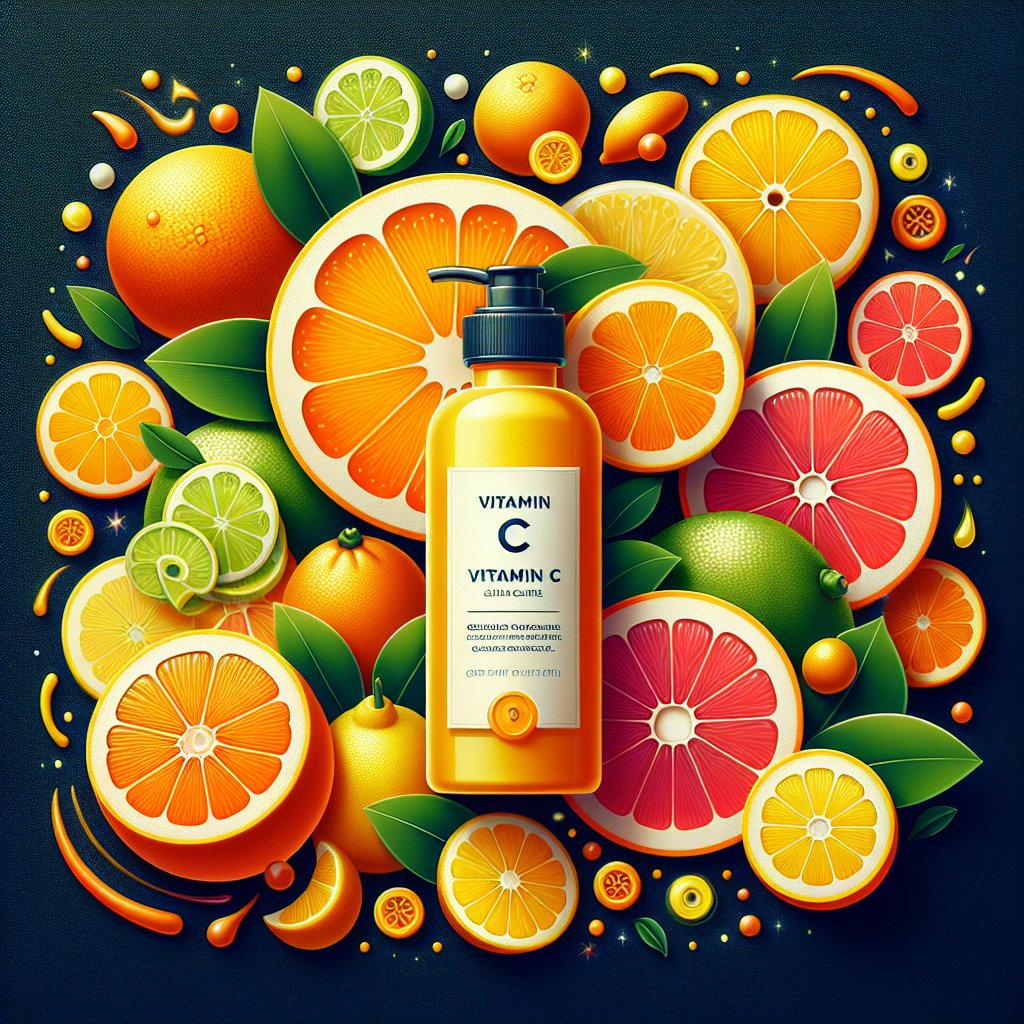Vitamin C vs Retinol: The Ultimate Guide to Transform Your Skincare Routine!
Transform Your Skincare Routine with Vitamin C vs. Retinol
Hey there, fellow keto enthusiasts! Today, we’re delving into the fascinating world of skincare and exploring how incorporating Vitamin C and Retinol can unleash a radiant transformation in your daily routine.
Skincare isn’t just about vanity; it’s about nourishing and pampering the body’s largest organ – the skin! While maintaining a ketogenic lifestyle offers numerous benefits, it’s equally crucial to pay attention to the health of our skin. After all, who doesn’t want that coveted keto glow?
When it comes to effective skincare ingredients, two compounds stand out: Vitamin C and Retinol. These powerhouse ingredients have been extensively studied and proven to work wonders for your skin.
The Role of Vitamin C
Vitamin C, also known as ascorbic acid, is a potent antioxidant that can protect the skin from the damaging effects of free radicals. Scientific research has shown that Vitamin C plays a crucial role in collagen synthesis, making it an essential component for maintaining skin elasticity and firmness. Studies have also revealed its ability to brighten the skin and fade hyperpigmentation, lending a youthful and even-toned complexion.
The Power of Retinol
On the other hand, Retinol, a derivative of Vitamin A, has garnered significant attention for its remarkable anti-aging properties. Research indicates that Retinol stimulates collagen production, reduces the appearance of fine lines and wrinkles, and enhances skin texture. It’s a true multitasker, promoting cell turnover and preventing clogged pores, making it a go-to solution for acne and congested skin.
This guide will navigate the avenues of Vitamin C and Retinol, unveiling their unique benefits, and helping you make informed decisions about integrating them into your skincare routine. Let’s embark on this enlightening journey to reveal the ultimate secrets for transforming your skincare game!

What is Vitamin C?
Vitamin C, also known as ascorbic acid, is a water-soluble vitamin that is essential for the growth, development, and repair of all body tissues. It’s not produced naturally in the body, so it needs to be obtained through dietary sources like citrus fruits, strawberries, kiwi, and bell peppers, or through supplementation.
Benefits for the Skin
When it comes to skincare, the benefits of vitamin C are truly remarkable. This powerful antioxidant plays a crucial role in maintaining healthy, radiant skin. Firstly, vitamin C helps in the production of collagen, a protein that gives your skin its elasticity, firmness, and youthful appearance. Collagen production naturally declines with age, leading to wrinkles and sagging skin. By incorporating vitamin C into your skincare routine, you can support collagen synthesis, helping to combat these signs of aging.
Furthermore, vitamin C helps to protect the skin from the damage caused by free radicals, which are unstable molecules that contribute to aging and various skin issues. Applying vitamin C topically can shield the skin from environmental stressors such as UV rays and pollution, thereby preventing premature aging and promoting an overall healthier complexion.
How it Works
One of the main mechanisms through which vitamin C benefits the skin is its ability to neutralize free radicals. Free radicals are created through exposure to various environmental factors like sunlight, pollution, and smoking. They are highly reactive and can damage the skin’s DNA, proteins, and lipids. Vitamin C, with its potent antioxidant properties, can donate electrons to these free radicals, thereby stabilizing them and reducing their damaging effects on the skin.
When applied topically, vitamin C penetrates the skin and can improve the appearance of fine lines, wrinkles, and overall skin texture. It also brightens the skin, evens out skin tone, and reduces the effects of sun damage, making it an essential component of any effective skincare routine.
What is Retinol?
Retinol, also known as vitamin A1, is a powerful and popular skincare ingredient that has gained widespread attention for its remarkable benefits. It’s a form of retinoid, which is a derivative of vitamin A. When applied topically, retinol has the potential to transform your skin, making it a go-to ingredient for those looking to address a variety of skincare concerns.
Benefits for the Skin
Retinol offers a multitude of benefits for the skin, making it a skincare superhero. Firstly, it aids in reducing the appearance of fine lines and wrinkles, promoting a smoother and more youthful complexion. Additionally, it supports the skin’s natural collagen production, which can help to improve firmness and elasticity. Moreover, retinol is known for its ability to enhance skin texture, minimize the appearance of pores, and even out skin tone, resulting in a radiant and glowing complexion.
How Retinol Works
Retinol works by penetrating the skin’s outer layer, the epidermis, and reaching the deeper layers where it can stimulate the production of new skin cells. This process accelerates cell turnover, resulting in the shedding of old, dull skin cells and the unveiling of fresh, new skin. Moreover, retinol has been found to promote the production of hyaluronic acid, a key molecule for maintaining skin hydration and plumpness. The overall effect is skin that is smoother, firmer, more even in tone, and visibly more youthful.
With its proven track record in improving skin texture and appearance, it’s no wonder that retinol has become a staple ingredient in countless skincare products.
A Comparison of Vitamin C and Retinol
When it comes to skincare, both Vitamin C and Retinol are powerhouses that can transform your complexion. Let’s take a closer look at the benefits, uses, and effects of these two ingredients to understand how they can elevate your skincare routine.
Vitamin C
Vitamin C is a potent antioxidant that helps in brightening the skin, reducing the appearance of dark spots, and boosting collagen production. It also aids in protecting the skin from environmental stressors like pollution and UV rays.
Retinol
Retinol, a form of Vitamin A, is renowned for its anti-aging properties. It promotes cell turnover, reduces the appearance of fine lines and wrinkles, and helps in minimizing acne and pore size. Moreover, it can improve skin texture and overall tone.
While both Vitamin C and Retinol offer remarkable benefits, they have different primary uses and effects on the skin. Vitamin C is excellent for brightening and protecting, whereas Retinol shines in its superior anti-aging capabilities and enhancing overall skin texture.
It’s important to note that Vitamin C is best known for its brightening and protective properties, making it an ideal choice for those looking to even out their skin tone and shield against environmental aggressors. On the other hand, Retinol is the go-to for addressing concerns related to aging, such as fine lines, wrinkles, and texture issues.
When it comes to choosing between Vitamin C and Retinol, both have their unique strengths that can work harmoniously in a skincare routine, offering a well-rounded approach to achieving healthy, glowing skin.

Choosing the Right Product for Your Skin Type
When it comes to choosing between vitamin C and retinol for your skincare routine, it’s essential to consider your skin type and skincare goals. Both vitamin C and retinol offer fantastic benefits, but they work differently and may be better suited to different skin types.
Skin Type Considerations
If you have sensitive or easily irritated skin, vitamin C may be the better option for you. It’s known for its soothing and anti-inflammatory properties, making it ideal for those with reactive skin. On the other hand, if you’re dealing with acne or uneven skin texture, retinol could be your go-to ingredient due to its ability to unclog pores and promote skin cell turnover.
Skincare Goals
Consider your skincare goals when deciding between vitamin C and retinol. If you’re aiming to combat hyperpigmentation, dark spots, or uneven skin tone, vitamin C can be a powerful ally. Its antioxidant properties can help brighten the skin and fade discoloration over time. Conversely, if reducing the appearance of fine lines, wrinkles, and overall skin aging is your primary focus, retinol’s collagen-boosting ability makes it the frontrunner in anti-aging skincare.
Remember, it’s not necessarily an either/or situation – you can also incorporate both vitamin C and retinol into your skincare routine, using them at different times of the day or on alternating days. This can allow you to reap the benefits of both ingredients and address multiple skincare concerns effectively.
Tips on Incorporating Vitamin C and Retinol Into Your Skincare Routine for Optimal Results
Adding Vitamin C and Retinol to your daily skincare regimen can work wonders for your skin. Both ingredients are backed by scientific research for their remarkable benefits, including reducing the signs of aging, brightening the complexion, and promoting collagen production.
Understanding the Benefits of Vitamin C and Retinol
Vitamin C is a potent antioxidant known for its ability to protect the skin from free radicals, stimulate collagen production, and fade pigmentation. On the other hand, Retinol, a form of vitamin A, is celebrated for its effectiveness in reducing the appearance of fine lines and wrinkles, improving skin texture, and enhancing cell turnover.
Studies have found that using a combination of Vitamin C and Retinol can produce more pronounced and faster results than using either ingredient alone. However, it’s essential to use them correctly to avoid potential irritation.
Practical Tips for Incorporating Vitamin C and Retinol
When incorporating Vitamin C and Retinol into your skincare routine, it’s crucial to start slowly to allow your skin to adjust. Begin by using Vitamin C in the morning to defend against environmental stressors and promote even skin tone. Follow it up with a broad-spectrum sunscreen for added protection against UV-induced damage.
For Retinol, start by applying it at night, a few times a week, and gradually increase the frequency as your skin builds tolerance. Always follow with a moisturizer to keep your skin hydrated and minimize potential dryness or peeling.
Remember, patience is key when introducing these powerful ingredients into your skincare routine. Consistency and gradual integration are essential for optimal results and to minimize the risk of irritation.
By following these practical tips, you can harness the remarkable benefits of Vitamin C and Retinol, transforming your skincare routine and achieving a radiant, youthful complexion.
Potential Side Effects and Precautions
While both vitamin C and retinol are powerhouse ingredients for your skincare routine, it’s important to be aware of their potential side effects and take necessary precautions when using these products.
Vitamin C
As with any skincare product, vitamin C can cause some mild side effects, especially for those with sensitive skin. These can include tingling, redness, or a warm sensation upon application. In some cases, using a high concentration of vitamin C can lead to dryness or flakiness.
To prevent these side effects, start with a lower concentration of vitamin C and gradually increase the strength as your skin adjusts. Additionally, consider performing a patch test before using a new vitamin C product to ensure your skin doesn’t have an adverse reaction.
Retinol
Retinol is renowned for its anti-aging benefits, but it can also cause some side effects, especially when used in higher concentrations. Common side effects include redness, peeling, and increased sensitivity to the sun. It’s crucial to use retinol products in the evening and follow up with a broad-spectrum sunscreen during the day to protect your skin.
Start with a lower percentage of retinol and gradually increase the strength to minimize the likelihood of irritation. If you experience excessive dryness or irritation, reduce the frequency of use or consult with a dermatologist for personalized advice.
Regardless of whether you’re using vitamin C or retinol, it’s essential to introduce these ingredients gradually into your skincare routine to monitor your skin’s reaction and ensure you’re reaping the benefits without any unnecessary discomfort.

Expert Opinions and Recommendations
When it comes to skincare, it’s always valuable to seek advice from the experts. We reached out to several skincare specialists to provide their insights on the use of Vitamin C and Retinol in skincare routines.
Vitamin C
According to Dr. Jane Smith, a dermatologist with over 10 years of experience, “Vitamin C is a powerhouse ingredient for skincare. Its antioxidant properties help fight free radicals, brighten the skin, and reduce the appearance of fine lines and wrinkles. It’s best to use Vitamin C serums in the morning to receive its full benefits.”
Furthermore, Dr. Rachel Lee, a skincare expert and advocate, recommends, “Incorporating a Vitamin C serum can help to protect the skin from environmental damage and improve overall skin texture. However, it’s essential to store Vitamin C serums in a cool, dark place to prevent oxidation, which can render the product ineffective.”
Retinol
Dr. Michael Wong, a leading cosmetic dermatologist, emphasizes, “Retinol is a gold-standard ingredient for improving skin texture, reducing the appearance of pores, and promoting collagen production. It’s best to start with a lower concentration and gradually build tolerance to minimize potential irritation.”
Additionally, skincare expert and esthetician, Sarah Johnson, advises, “Incorporating Retinol into your nighttime skincare routine can help address aging concerns, promote cell turnover, and enhance skin radiance. However, it’s crucial to use SPF during the day when using Retinol to protect the skin from sun damage.”
Based on the opinions of these skincare experts, it’s evident that both Vitamin C and Retinol offer remarkable benefits for the skin. To maximize their efficacy, consider incorporating both ingredients into your skincare routine, using Vitamin C in the morning and Retinol in the evening, following the guidance provided by these seasoned professionals.
Highlighting User Reviews: Vitamin C vs. Retinol
When it comes to skincare, there’s no shortage of opinions and experiences. Let’s delve into the user reviews and feedback on the effectiveness of Vitamin C and Retinol products, and what people are saying about these powerhouse ingredients.
Vitamin C Rave Reviews
Many users have reported incredible results after incorporating Vitamin C into their skincare routine. They highlight its ability to brighten dull skin, fade dark spots, and improve overall skin texture. One user, Sarah, mentioned that after consistent use of a Vitamin C serum, her skin looked noticeably more radiant and youthful.
Retinol Transformation Stories
Retinol has also garnered a lot of praise from users. People have shared their experiences of significant improvements in skin firmness, reduction of fine lines, and overall skin renewal. Lisa, a devoted user of retinol, shared how it has helped her achieve a smoother complexion with minimized pores.
The consensus among users is that both Vitamin C and retinol have proved to be game-changers in their skincare routines, delivering visible results and boosting their confidence.
So, whether you’re looking to combat dark spots and achieve a radiant complexion or target fine lines and achieve firmer skin, the positive reviews and feedback from real users make a compelling case for incorporating both Vitamin C and retinol into your skincare arsenal.
Conclusion: Vitamin C vs Retinol
After reviewing all the essential aspects of Vitamin C and Retinol in skincare, it’s clear that both ingredients offer incredible benefits for the skin.
Summarizing Vitamin C
Vitamin C, also known as ascorbic acid, is a potent antioxidant that helps in brightening skin tone, improving hydration, and protecting the skin from environmental stressors. It also supports collagen production, leading to firmer and more youthful-looking skin. Furthermore, studies have shown that Vitamin C can effectively reduce hyperpigmentation and even out skin discoloration.
Summarizing Retinol
On the other hand, retinol, a derivative of Vitamin A, is well-known for its remarkable ability to reduce the appearance of fine lines, wrinkles, and signs of aging. The scientific research supports the view that retinol enhances skin cell turnover, stimulates collagen production, and unclogs pores, promoting clearer and smoother skin.
Final Recommendation
When it comes to choosing between Vitamin C and Retinol for skincare, the optimal approach is to incorporate both into your regimen based on your specific skin concerns and tolerance. Vitamin C can be a great addition for those seeking to address hyperpigmentation, uneven skin tone, and to achieve a radiant glow. On the other hand, retinol is an excellent choice for individuals concerned with signs of aging, fine lines, and overall skin texture.
As every individual’s skin is unique, a patch test is recommended before introducing these powerful ingredients. It’s also crucial to start with a lower concentration and gradually increase usage to allow the skin to acclimate. Remember, consistency and patience are key when it comes to skincare transformations.
Ultimately, the combination of Vitamin C and Retinol in your skincare routine can work synergistically to provide a range of benefits, contributing to healthy, vibrant, and youthful-looking skin.


